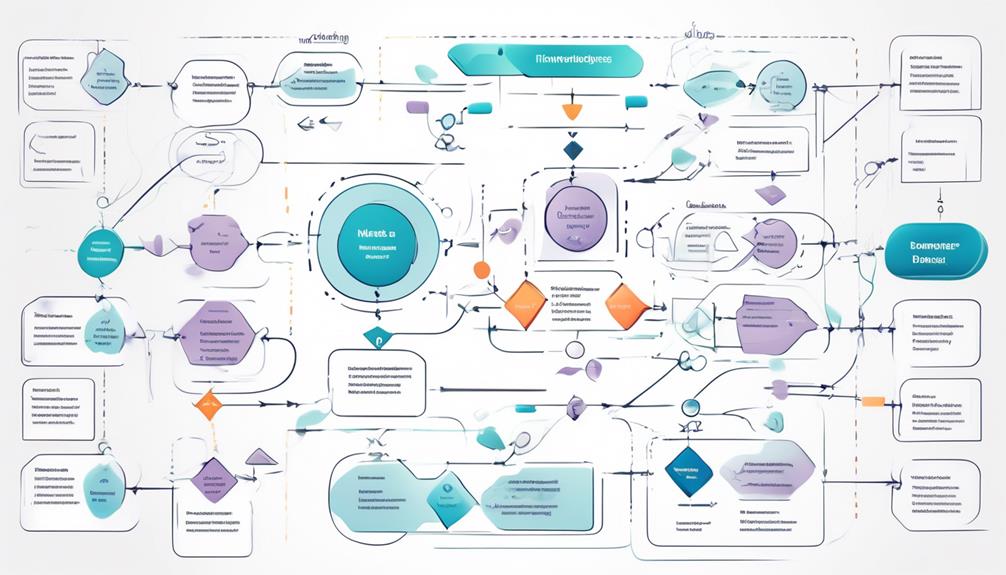Have you ever taken a moment to contemplate the real importance of quality assurance in the field of software development? The term is commonly used in the industry, but do we truly understand its fundamental significance?
Quality assurance goes beyond mere testing and encompasses a comprehensive approach to ensuring the integrity and reliability of software products. As we navigate through the complexities of software development, it's crucial to grasp the significance of quality assurance in delivering exceptional products to our clients and end-users.
So, what exactly does quality assurance entail, and how does it impact the software development lifecycle? Let's explore this fundamental aspect of our work together.
Key Takeaways
- Quality assurance ensures product integrity and reliability throughout the software development lifecycle.
- QA methodologies focus on proactive and reactive activities, stakeholder involvement, and addressing the root cause of defects.
- QA specialists are responsible for creating and performing tests, identifying errors, tracking defects, and ensuring smooth deployment processes.
- Software quality assurance is important for customer satisfaction, cost reduction, brand reputation, process improvement, and overall software quality and reliability.
Principles of Quality Assurance
The principles of quality assurance guide our approach to ensuring product quality through proactive and reactive activities in every phase of the software development lifecycle. As QA team leads, we're committed to upholding the highest quality standards throughout the software development process.
Our QA process encompasses rigorous testing and a defect management approach that focuses on continuous improvement. We prioritize best practices to prevent software defects and ensure that our approach to quality assurance is rooted in a risk-based methodology.
To achieve the highest quality standards, our approach to quality assurance is methodical and analytical. We emphasize stakeholder involvement and actively seek to address the root cause of defects, rather than just treating the symptoms. By following these principles, we aim to create a culture of continuous improvement within our QA team.
Our attention to detail and dedication to quality assurance principles enables us to deliver software that meets and exceeds the expectations of our stakeholders.
QA Methodologies and Best Practices

Emphasizing methodical and analytical approaches, our QA methodologies and best practices build upon the principles of quality assurance to ensure high product quality throughout the software development lifecycle.
QA methodologies encompass proactive and reactive activities to ensure that software products meet specific requirements and standards.
Best practices in QA involve continuous improvement, stakeholder involvement, and root cause analysis.
Implementing automated tests, shifting left, and embedding security into software quality are key best practices in QA.
By incorporating these best practices, we can effectively integrate quality control processes into the software development process.
Additionally, gathering feedback from end-users and stakeholders is crucial for continuous improvement in QA.
This iterative approach to software quality assurance allows us to adapt and refine our processes to meet evolving needs and standards.
Ultimately, our QA methodologies and best practices are designed to uphold the highest standards of product quality assurance throughout the development lifecycle, ensuring that the end product meets or exceeds expectations.
Role of QA in Software Development Lifecycle
Throughout the software development lifecycle, QA specialists actively contribute to maintaining high product quality by playing a critical role in analyzing, testing, and ensuring adherence to quality standards. The role of QA in the software development lifecycle includes:
- Building Adequate Analysis Group: QA specialists are involved in the early stages of development, ensuring that the requirements and specifications are thoroughly analyzed and understood.
- Testing and Integration Preparation: QA specialists prepare for the testing and integration phase during development, ensuring that the necessary testing environments and tools are in place.
- Quality Control Activities: QA specialists engage in quality control activities to ensure that the product meets quality standards. This involves various types of tests such as smoke tests, scenario tests, exploratory tests, and regression tests.
- Continuous Testing and Monitoring: QA specialists continuously test and monitor the software to identify defects and errors, using control charts and other statistical tools to track and manage the quality of the product.
The role of QA in the software development lifecycle is crucial for delivering high-quality software that meets user experience expectations and business requirements.
Responsibilities of QA Specialists

As QA specialists, our responsibility lies in meticulously creating and performing tests to uphold the quality of the software. We play a critical role in identifying errors and providing feedback to improve the product.
Our focus is on verifying that the final software product meets quality requirements and delivers a seamless, error-free user experience. To achieve this, we employ a quality attributes approach, ensuring that the software meets standards for reliability, performance, and usability.
Throughout the development processes, we're responsible for developing comprehensive test cases, tracking defects, and conducting automated tests to maintain the highest quality standards.
Additionally, our responsibilities extend to being on call during deployments, conducting smoke testing, and ensuring smooth deployment processes to minimize user impact.
Ultimately, our dedication to quality assurance not only safeguards the brand reputation but also enhances customer satisfaction. We understand the importance of our role in maintaining the integrity and reliability of the software, and we're committed to upholding these responsibilities with the utmost diligence and precision.
Importance of Software Quality Assurance
Software Quality Assurance is an indispensable aspect of the software development process, ensuring that products meet high-quality standards and customer expectations. The importance of Software Quality Assurance can't be overstated, and here are four reasons why it's crucial:
- Customer Satisfaction: QA ensures that the software product meets the unique requirements of the user, leading to high levels of customer satisfaction.
- Cost Reduction: By identifying and resolving potential issues early in the development process, QA helps in reducing the cost of fixing defects that may arise later.
- Reputation Enhancement: A high-quality software product, ensured through QA, enhances the reputation of the brand and increases customer trust and loyalty.
- Process Improvement: QA functions parallel to the software development life cycle, ensuring continuous monitoring, improvement of processes, and thorough testing before release.
In essence, Software Quality Assurance plays a pivotal role in not only ensuring the quality and reliability of the software product but also in enhancing customer satisfaction, reducing costs, and improving the brand's reputation.
Frequently Asked Questions
What Is Quality Assurance in Software Development?
Quality assurance in software development involves proactive and reactive activities to ensure product quality. It's prevalent in every phase of the software development lifecycle, including analysis, design, development, testing, and deployment.
Our understanding emphasizes preventive and proactive measures to contribute to excellent software development. Expert QA teams early identify and resolve potential issues, match unique client requirements, reduce the risk of bugs, and enhance product reliability.
What Is Your Understanding of Quality Assurance?
We approach quality assurance with a comprehensive mindset, meticulously integrating proactive and reactive measures throughout the software development lifecycle. Our focus is on preventing quality deterioration and ensuring the end product meets specific requirements.
From requirement analysis to testing and deployment, we implement a set of processes and practices to uphold product quality. Our approach aims to deliver high-quality software through meticulous attention to detail and adherence to best practices.
What Is the Role of a Quality Assurance Engineer in Software Development?
The role of a quality assurance engineer in software development is pivotal. We meticulously analyze, plan, and execute comprehensive test strategies to ensure the overall quality of the end product.
Our involvement spans the entire development lifecycle, from inception to deployment, collaborating closely with the development and DevOps teams.
We aim to identify and rectify potential issues early, contributing significantly to the reliability and credibility of the software product.
What Is the Role of QA in the Sdlc?
In the software development lifecycle, QA plays a crucial role by ensuring quality at every phase. Our team meticulously reviews code, conducts thorough testing, and implements quality control measures to maintain high standards.
This involvement enhances the overall product quality, fostering a reliable end product. By focusing on attention to detail and methodical testing, our QA practices contribute to the success of the entire development process.
Conclusion
In conclusion, quality assurance in software development is crucial for ensuring the high quality of the end product. By following established principles and methodologies, QA specialists play a vital role in every phase of the development lifecycle.
Just like a skilled chef meticulously selects and prepares the finest ingredients to create a perfect dish, QA specialists carefully monitor and test the software to ensure it meets specific requirements and delivers a flawless user experience.









